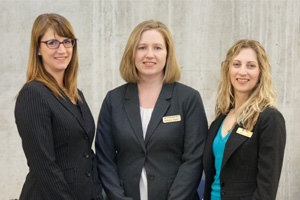UOIT Faculty of Science stages Forensic Science Research Day
UOIT Forensic Science students present research findings to industry peers and professionals
May 6, 2013

Opportunities for hands-on research and practical experiences form a key component of the undergraduate curriculum at the University of Ontario Institute of Technology (UOIT). This approach to student learning helps ensure UOIT students are job-ready upon graduation and prepared to lead and excel in the workplace thanks to their highly developed problem-solving and leadership skills.
One such example of UOIT’s commitment to prepare students for their future career is through the Faculty of Science’s Forensic Science program, which embeds hands-on learning and practical experience in its curriculum.
Every year, undergraduates are given the opportunity to present their research thesis projects before an audience of peers, faculty, law enforcement, forensic scientists and other professionals at Forensic Science Research Day. On April 29, fourth-year students were assessed on their findings and conclusions on a topic they researched all year under the supervision of a faculty member.
“This is the fifth year for Forensic Science Research Day and it is always a great opportunity for students to find which field in forensics interests them the most,” said Dr. Helene LeBlanc, Assistant Professor, Faculty of Science, and Undergraduate Program Director, Forensic Science. “The research and effort they put into these projects is great training for their future career.”
Some of the areas of research that were presented this year included:
- Bloodstain analysis
- Contamination sources
- Firearms and ammunition investigation
- Forensic fingerprint evidence
- Lip print analysis
- Skeletal remains recovery and analysis of volatile organic compounds
The thesis project provides students with the opportunity to gain additional training in practical research methods and develop the required skills to enter the competitive field of forensic science.



